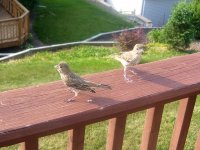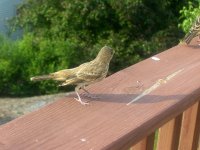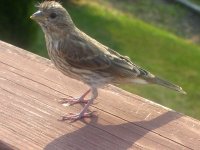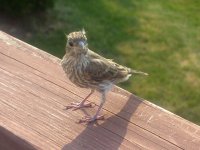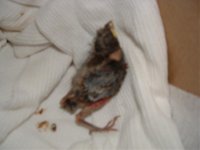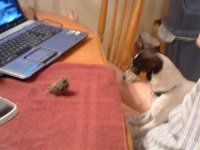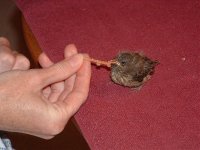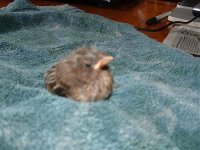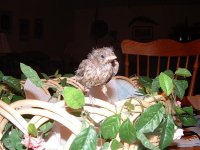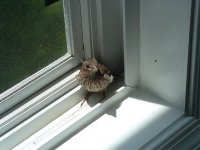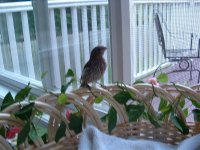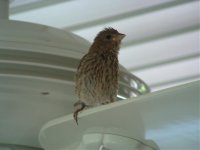Your suggestions helped me this past week.
Wabby,
I'm the woman from Reading, PA who found the baby bird in one of my gardens on Memorial Day. It's been doing well since then and has surprised itself a few times when it has gotten airborne for a few seconds of wing flapping. I took your suggestion last week of mixing cat kibble soaked in water, canned dog food (beef), (which I think was yours) hard boiled egg yolk, and I added peanut nuggets, a soft high energy food pellet made with suet and roasted peanuts which I was able to mixed easily with the other ingredients to make a tasty meal (at least to my little bird). I feed it with a blunted toothpick (your very good idea) and make a new batch every other day because of the egg and the mixture sitting at room temperature during the day. I sit the bird at the window screen most of the day so it can hear and see the other birds. I'm worried about its lack of fear of humans and animals. I have two dogs, a six pound chihuahua and 95 pound golden retriever, both of whom adore this little bird. The little dog especially keeps checking on the bird to make sure it's safe. And no, to all of you who are thinking this, Jack does not want to secretly eat it. The bird has no startle reflex which makes me think that it won't have a chance if I let if go once it can fly and take care of itself. If it is in fact a house sparrow and I can lawfully keep it, I may have to for its safety. If it is any other type of bird, I guess I'll have to contact a bird sanctuary. I have a few days yet before anything definite must be done. I'd like to post a picture here but can't seem to figure out how to do it. Anyway, Wabby, I enjoy reading your posts and find them most helpful. On behalf of the four little birds that you took into your home and cared for, thank you, you've done a fine job! Regina
Wabby,
I'm the woman from Reading, PA who found the baby bird in one of my gardens on Memorial Day. It's been doing well since then and has surprised itself a few times when it has gotten airborne for a few seconds of wing flapping. I took your suggestion last week of mixing cat kibble soaked in water, canned dog food (beef), (which I think was yours) hard boiled egg yolk, and I added peanut nuggets, a soft high energy food pellet made with suet and roasted peanuts which I was able to mixed easily with the other ingredients to make a tasty meal (at least to my little bird). I feed it with a blunted toothpick (your very good idea) and make a new batch every other day because of the egg and the mixture sitting at room temperature during the day. I sit the bird at the window screen most of the day so it can hear and see the other birds. I'm worried about its lack of fear of humans and animals. I have two dogs, a six pound chihuahua and 95 pound golden retriever, both of whom adore this little bird. The little dog especially keeps checking on the bird to make sure it's safe. And no, to all of you who are thinking this, Jack does not want to secretly eat it. The bird has no startle reflex which makes me think that it won't have a chance if I let if go once it can fly and take care of itself. If it is in fact a house sparrow and I can lawfully keep it, I may have to for its safety. If it is any other type of bird, I guess I'll have to contact a bird sanctuary. I have a few days yet before anything definite must be done. I'd like to post a picture here but can't seem to figure out how to do it. Anyway, Wabby, I enjoy reading your posts and find them most helpful. On behalf of the four little birds that you took into your home and cared for, thank you, you've done a fine job! Regina




